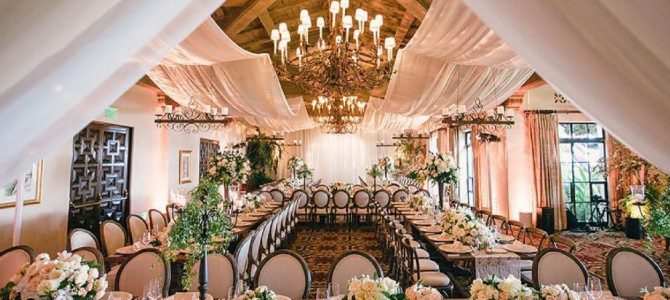
The cherry blossoms are in full bloom and spring is upon us. With it, engagement and wedding season looms large, and brides-to-be the world over are in conniptions over all the wrong things.
A glance at the divorce rate in America indicates that our culture (if the word even applies at this point) has much to learn about making marriages last, let alone cultivating happy ones. Yet people who want happy, permanent marriages continue to swallow, hook, line, and sinker, pop-culture’s narrative on the “necessary” ingredients for a good engagement, wedding, and marriage.
Dear future brides and grooms, please take a moment to consider the practices you choose to adopt, and your own motives for adopting them. The overwhelmingly materialistic norms surrounding contemporary weddings are not simply irrelevant to marital happiness. Rather, I propose (pun intended) that many are positively harmful.
What Wedding Extravagance Says About Our Character
While the pressure is on (thank you, “social” media) for normal couples to have celebrity-worthy rings, engagement photo ops, and reception venues, I think, and studies confirm, that excessive spending on these things is more likely to hurt than help your marriage. The writers of the study suggest the correlation found between big spending on engagement rings and weddings, and higher divorce rates, is perhaps due to the financial strain these things place on a couple’s relationship.
This seems reasonable; going into debt rarely helps a relationship. But I wonder if there is a more central explanation, one that has to do with the disposition that the people who spend so very much (2016’s average wedding cost: $35,329; pardon me while I hyperventilate) are bringing to their nuptials.
Simply put, we have become obsessed with making our weddings into the perfect fulfillment of an ideal given to us by marketers and Instagram that has more to do with celebrating our own vanity and asserting our social status than marriage. This undermines the health of our relationships.
The common assumption that a small engagement ring is a sad engagement ring illustrates exactly this problem. Huge diamonds are for rich people. If you are rich, lovely. Huge diamonds are beautiful, and if you can afford them, they might not hurt anything. But caring about something like the carat of a diamond has great potential to damage your future marriage, by blinding you to questions of real importance (e.g., Does the man who gave me this massive shiny rock possess the discipline and virtue necessary to becoming a good spouse?) and encouraging you to seek happiness in—and judge your relationship by—material objects, which will always fail to satisfy.
Consider the Engagement Ring
Do I advocate foregoing engagement rings altogether? No. Most disciplined men with a job can, in a few months’ time, scrape together the several hundred dollars necessary to procure a modest ring composed of a precious metal and some kind of gemstone. This seems like a good and fitting process for an aspiring groom to go through. It gives him an opportunity to be a man, make sacrifices to win his beloved, and practice the care and economy responsible husband-hood requires.
Similarly, the ring itself is a beautiful symbol that bespeaks the love that procured it. When I look at my own engagement ring, I am reminded of my husband’s self-sacrificing love for me. I know this love motivated him to live on eggs and pasta through months of college student poverty, carefully saving his barista-sized paychecks until he could afford the ring with which he asked for my hand. The point is not that we should reject any practice that involves material things. We are incarnate beings and material things are good and proper to us. The important thing is to examine our practices and embrace them only if they are fitting to and at the service of love and marriage.
If we were discerning in this way about weddings themselves, cataloguing all the now “essential” practices we should abandon would prove a formidable task. Suffice it to say that, while a wedding should be beautiful and celebratory (on which note: if you are going to shell out on something, let it be the alcohol), with a little creativity, these things can be achieved on the smallest of budgets, in a way that allows the bride and groom to focus on the things that really matter about their wedding.
Preparing for your wedding day should mean preparing your heart for the sacrifice you vow to make of yourself for the good of your beloved. Your wedding should bespeak the beauty and gravity of this commitment, and celebrate with gratitude the family and friends who have made your marriage possible and will continue to support it throughout your lives. Of all the days in your life to turn into a social-media-driven celebration of your own vanity, don’t let it be this day.
A Realistic Budget Would Help
A good way to fight this temptation is to have a modest budget that you stick to without wasting a second thought on all the “likes” your pictures would get if you had just the right venue, flowers, cake, shoes, and fancy chalkboard signs that you can’t afford and don’t need. Again, I’m not saying these things must be abandoned altogether. I am saying that you will be much happier, and these things more affordable than you think, if you don’t allow the Instagram wars to set your standards and tell you what you need to be happy.
Don’t wait to get married until you can procure a massive bling ring. Don’t wait to get married until you can create the perfectly bloggable Insta-wedding. Don’t even wait until you can finance an elaborate trip for your honeymoon.
Yes, your lifelong commitment to one another is a beautiful thing that ought to be celebrated in ways that are proportional to your budget. But if you are marrying the right person, simply beginning your life together will be celebration enough.









